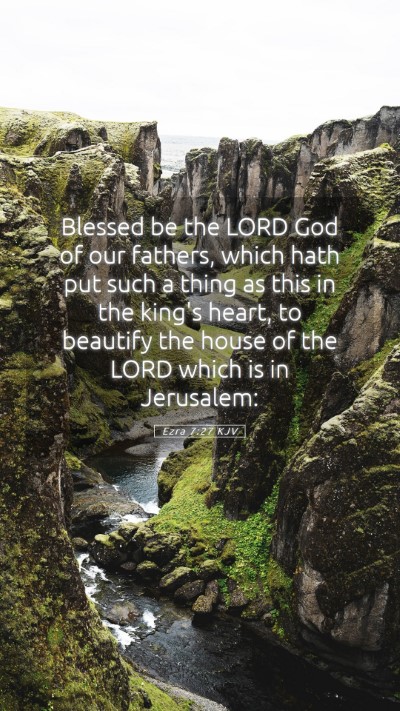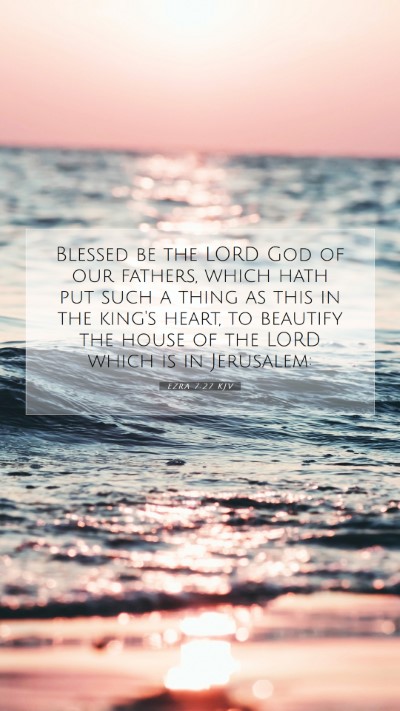Old Testament
Genesis Exodus Leviticus Numbers Deuteronomy Joshua Judges Ruth 1 Samuel 2 Samuel 1 Kings 2 Kings 1 Chronicles 2 Chronicles Ezra Nehemiah Esther Job Psalms Proverbs Ecclesiastes Song of Solomon Isaiah Jeremiah Lamentations Ezekiel Daniel Hosea Joel Amos Obadiah Jonah Micah Nahum Habakkuk Zephaniah Haggai Zechariah MalachiEzra 7:27 Meaning
What is the meaning of Ezra 7:27?
Blessed be the LORD God of our fathers, which hath put such a thing as this in the king's heart, to beautify the house of the LORD which is in Jerusalem:
Ezra 7:27 Bible Verse Meaning
Bible Verse Meaning of Ezra 7:27
Ezra 7:27 states, "Blessed be the LORD God of our fathers, which hath put such a thing as this in the king's heart, to beautify the house of the LORD which is in Jerusalem:" This verse reflects Ezra’s deep gratitude toward God for the favor shown to him and the Jewish people through King Artaxerxes.
Overall Significance of the Verse
This verse captures a moment of divine providence, illustrating how God moves the hearts of kings and rulers to fulfill His purposes. It emphasizes the importance of acknowledging God's hand in the affairs of men, particularly in matters concerning worship and the restoration of the temple in Jerusalem.
Insights from Public Domain Commentaries
-
Matthew Henry's Commentary
Henry points out that Ezra's blessing of God signifies recognition of God's sovereignty and mercy. He elaborates that the king's willingness to aid in beautifying the temple demonstrates God's providential care for His people and their worship. It underscores the idea that the hearts of leaders are in God's hands, and He can incline them to act according to His will.
-
Albert Barnes' Notes on the Bible
Barnes emphasizes the phrase "for putting such a thing as this in the king's heart," suggesting that this reflects God’s influence over human decisions. It's a reminder of how God's purposes can manifest even through secular authorities, leading to outcomes that benefit His people and promote religious devotion.
-
Adam Clarke's Commentary
Clarke provides a detailed examination of the historical context that led to the king's support for the temple's restoration. He notes that the temple was a central place of worship for the Jewish people, and the support from the Persian king highlights a significant moment of rejuvenation both spiritually and culturally for the Israelites.
Bible Verse Interpretations
The meaning of Ezra 7:27 can be interpreted in several important ways:
-
Divine Sovereignty:
This verse illustrates God’s sovereignty over earthly rulers and His ability to use them to fulfill His purposes.
-
Gratitude in Worship:
Ezra’s response teaches the importance of gratitude, recognizing that all good things comefrom God, including the willingness of leaders to support divine projects.
-
Faithfulness of God's People:
The restoration of the temple signifies the faithfulness of God's people in maintaining their covenant relationship with Him, as they seek to honor Him with a beautified place of worship.
Application of this Verse
When applying the teachings of this verse, one can reflect on the following:
- Recognizing God’s Hand: Evaluate how to recognize moments when God is working through others in your life.
- Gratitude in Daily Life: Maintain a spirit of gratitude, particularly in relation to those who help support your spiritual journey.
- Commitment to Worship: Understand the importance of maintaining sacred spaces and practices in your community.
Related Scripture Cross References
Ezra 7:27 resonates with themes found in the following scriptures:
- Proverbs 21:1: "The king's heart is in the hand of the LORD, as the rivers of water: he turneth it whithersoever he will."
- Psalms 118:1: "O give thanks unto the LORD; for he is good: because his mercy endureth forever."
- 2 Chronicles 36:23: "Thus saith Cyrus king of Persia, All the kingdoms of the earth hath the LORD God of heaven given me;"
- Nehemiah 2:4-5: "Then the king said unto me, For what dost thou make request? So I prayed to the God of heaven, and I said unto the king..."
Conclusion
In summary, Ezra 7:27 is a profound reminder of God’s active role in guiding the affairs of nations and people for His purposes. As you explore this verse and its implications, consider how it reflects broader themes of divine sovereignty, gratitude, and the importance of committed worship within your life.


